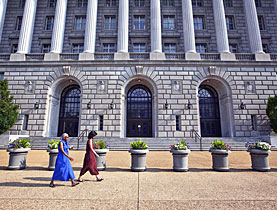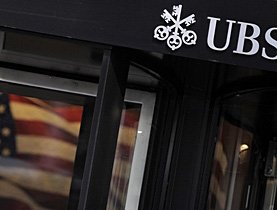Amnesty extended as tax dodgers stampede

A United States tax amnesty has been extended to allow lawyers to process a flood of repentant evaders, but some still appear to be weighing up their options.
The US tax agency, the Internal Revenue Service (IRS), this week gave tax dodgers another month, until October 15, to voluntarily declare their hidden assets and escape the worst punishments.
Clients of UBS are among those being hunted by the IRS after the Swiss bank admitted some advisors had helped US account holders evade taxes in the past. The Swiss government brokered a deal last month to release the confidential details of 4,450 UBS clients to the US authorities.
Some 500 UBS clients in the US have been warned in a letter by the bank that their names will be handed over as part of that deal. They have been given 20 days to find a lawyer in Switzerland if they intend to appeal.
The Swiss authorities are hiring extra judges to sit in the Federal Administrative Court in anticipation of such appeals. This measure would also help Switzerland live up to its promise the US to speed up the legal process.
Lawyers inundated
But it appears that most Americans, whether at UBS or other banks, are taking the opportunity to come clean and pay backdated taxes. The amnesty promises to limit additional penalties to 20 per cent of the total assets held abroad.
The IRS said 3,000 US citizens had already applied for the voluntary disclosure scheme, compared to 88 last year when there was no special amnesty.
Scott Michel, of Washington-based law firm Caplin & Drysdale, has been inundated with new clients in the last few days. He told swissinfo.ch that the amnesty extension was granted to give more time to process these disclosures.
“A number of practitioners communicated the substantial increase in client interest approaching the deadline and expressed concern that we could provide adequate levels of service in such a short time frame. The IRS is to be commended for responding in giving everybody another month,” he said.
“We can now address those issue in an appropriate way without the sword of Damocles hanging over everybody’s head.”
Catch 22
Only the first 500 names on the list of 4,450 UBS clients so far know that their confidential details will be handed over to the US.
A Swiss court ruling in Lugano on Monday will now oblige UBS branches in canton Ticino to contact any client if their details have been or will be passed on to the IRS, and to state the reasons why.
The case, brought by Lugano lawyer Paolo Bernasconi, appears to show that some people are still weighing up their options before the tax amnesty expires. Account holders who are not on the list could have less incentive to come clean, although they could still be tracked down at a later date.
But Scott Michel had a stark warning for UBS clients who are thinking about appealing against the release of their confidential details to the IRS.
US law requires citizens to formally lodge details of overseas litigation with the Department of Justice. And by doing so they would be obliged to reveal their names.
“This would obviously be a kind of catch 22,” Michel told swissinfo.ch.
Matthew Allen, swissinfo.ch
The IRS is not the only tax agency to be operating an amnesty at the moment.
The governments of Italy, Britain and Germany have all approved their own windows in which tax dodgers can come clean with a lesser punishment.
Tax amnesties are also nothing new – this is Italy’s third in the last nine years.
Swiss banks have previously been successful at keeping hold of assets declared during amnesties or luring such funds back to their accounts when the heat had died down. However, Swiss banks may be harder hit by tax amnesties this time around.
Unlike previous amnesties, the Italian authorities this time are insisting that assets are repatriated from non-EU countries as well as being declared.
The erosion of Swiss banking secrecy could also make Switzerland a less attractive place for tax cheats to hide their money.
Swiss banks have responded to the threat by increasing onshore operations in several countries, hoping to attract wealth without breaking local laws.

In compliance with the JTI standards
More: SWI swissinfo.ch certified by the Journalism Trust Initiative





You can find an overview of ongoing debates with our journalists here. Please join us!
If you want to start a conversation about a topic raised in this article or want to report factual errors, email us at english@swissinfo.ch.